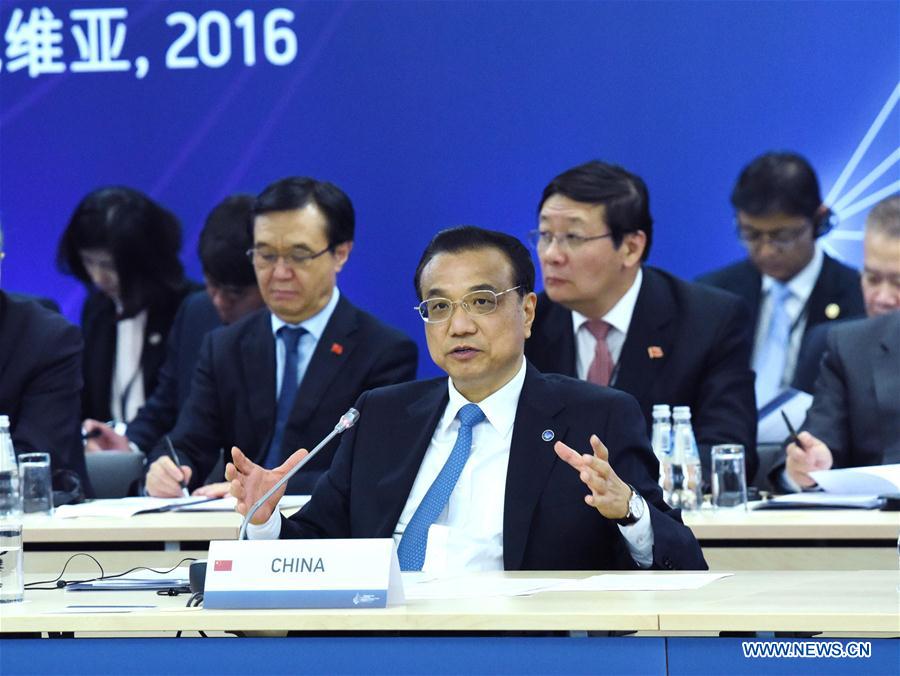Li Keqiang's new diplomatic initiative
- By George N. Tzogopoulos
 0 Comment(s)
0 Comment(s) Print
Print E-mail China.org.cn, November 7, 2016
E-mail China.org.cn, November 7, 2016
|
|
| Chinese Premier Li Keqiang (front) attends the Fifth Meeting of Heads of Government of Central and Eastern European Countries (CEEC) and China in Riga, Latvia, Nov. 5, 2016. (Xinhua/Rao Aimin) |
Approximately five weeks after his visit to New York on the occasion of the UN General Assembly and Cuba, Chinese Premier Li Keqiang embarks on a new international initiative which includes stops in Kazakhstan, Kyrgyzstan, Latvia and Russia. The agenda of Li's diplomatic trip is based on bilateral issues. However, it is also directly connected to critical multilateral economic and geopolitical themes.
At the bilateral trade level, relations between China and Kazakhstan are rapidly intensifying. An official publication of the government of the latter titled "Invest in Kazakhstan" shows that the trade volume was worth of $10.4 billion in 2015 and that the two countries have signed agreements worth $24 billion, mostly geared toward industrialization and improving logistics.
Also, the "Khorgos – Eastern Gates" special economic zone, located near the border of China and Kazakhstan, boosts both their economies. Correspondingly, the bilateral strategic partnership outlines common energy and security considerations as well as mutual interests for joint synergies to secure regional stability.
The visit of Li in Astana confirms the general progress already made following the visit of President Nursultan Nazarbayev to China fourteen months ago and his meeting with his Chinese counterpart Xi Jinping.
Moreover, relations between China and Kyrgyzstan are also showing remarkable growth, although the population of the latter is much smaller – approximately 5.8 million – than that of Kazakhstan which exceeds 18 million people.
According to Kyrgyzstan official data, the first half of 2016 reached $672 million dollars worth of bilateral trade, constituting a 60 percent increase in comparison to the same period last year. The country's geographical position further raises its significance for Beijing.
This is because it shares a border with Xinjiang Uygur Autonomous Region. The need for efficient cooperation against terrorism has become more urgent than ever after an August suicide attack at the Embassy of China in Kyrgyzstan. Local authorities attributed the terror act to Uighur militants.
As far as Latvia is concerned, the country – a small European one with a population of approximately 2 million and with a brief history of 12 years as a member of the EU. Despite the relatively small scale, bilateral relations with China are flourishing.
Data from the Latvian China Business Council demonstrates that the volume of exports of goods from Latvia to China amounted to €105.9 million in 2015 which is 0.4 percent more than in 2014. Also, in 2015 the volume of imports of goods from China to Latvia amounted to €415.1 million, an increase of 17.7 in comparison to 2014.
Within this framework, Li agreed with Latvian President Raimonds Vejonis in Riga to expand ties at the business, trade, infrastructure, culture, education and people-to-people exchange level. In addition, Latvia has for years made a systematic effort to promote its products to the Chinese market including fish, meat, milk and medical products.
In relation to Russia, the bilateral relationship has a critical dimension due to the economic and political power of both countries. 2015 was not particularly fruitful. Trade volume had dropped by 27.8 percent to $64.2 billion according to a report by The Moscow Times, which quotes a spokesman for the Chinese customs department.
Beijing and Moscow are still committed to catching the target of a volume worth $200 billion by 2020 – as agreed by Presidents Xi and Putin – despite difficulties and the problematic international environment. This bilateral relationship goes beyond economics and into the political sphere and has therefore sparked a debate as to whether it contains strategic depth. The possibility of a Sino-Russian political and military alliance has only increased the concern in the West, which has been growing since the beginning of joint naval exercises.
From another perspective, the new international diplomatic activity of Premier Li Keqiang secures China's national interests vis-à-vis Kazakhstan, Kyrgyzstan, Latvia and Russia, but also reflects two broader strategic calculations.
First, it strengthens Beijing's role in the Shanghai Cooperation Organization (SCO) as the 15th prime ministers' meeting took place in Bishkek, the capital of Kyrgyzstan. As the Chinese premier explained in his speech, the enhancement of the "Regional Anti-Terrorist Structure" and the reconstruction of Afghanistan are among the top priorities.
And second, Li's new international diplomatic activity promotes Beijing's policy towards Central and Eastern Europe. Riga, the capital of Latvia, hosts this year so-called "16+1 Meeting" which was held for the first time in Warsaw in 2012.
More importantly, Li' diplomatic trip brings closer four countries – Kazakhstan, Kyrgyzstan, Latvia and Russia – to China under the umbrella of an unprecedented integration model. The implementation of the "Belt and Road" initiative is the driving force of interconnectedness and expanding development between different regions, countries and continents. This is perhaps Beijing's biggest credit at the beginning of the 21st century.
George N. Tzogopoulos is a columnist with China.org.cn. For more information please visit:
http://www.china.org.cn/opinion/GeorgeNTzogopoulos.htm
Opinion articles reflect the views of their authors, not necessarily those of China.org.cn.







Go to Forum >>0 Comment(s)